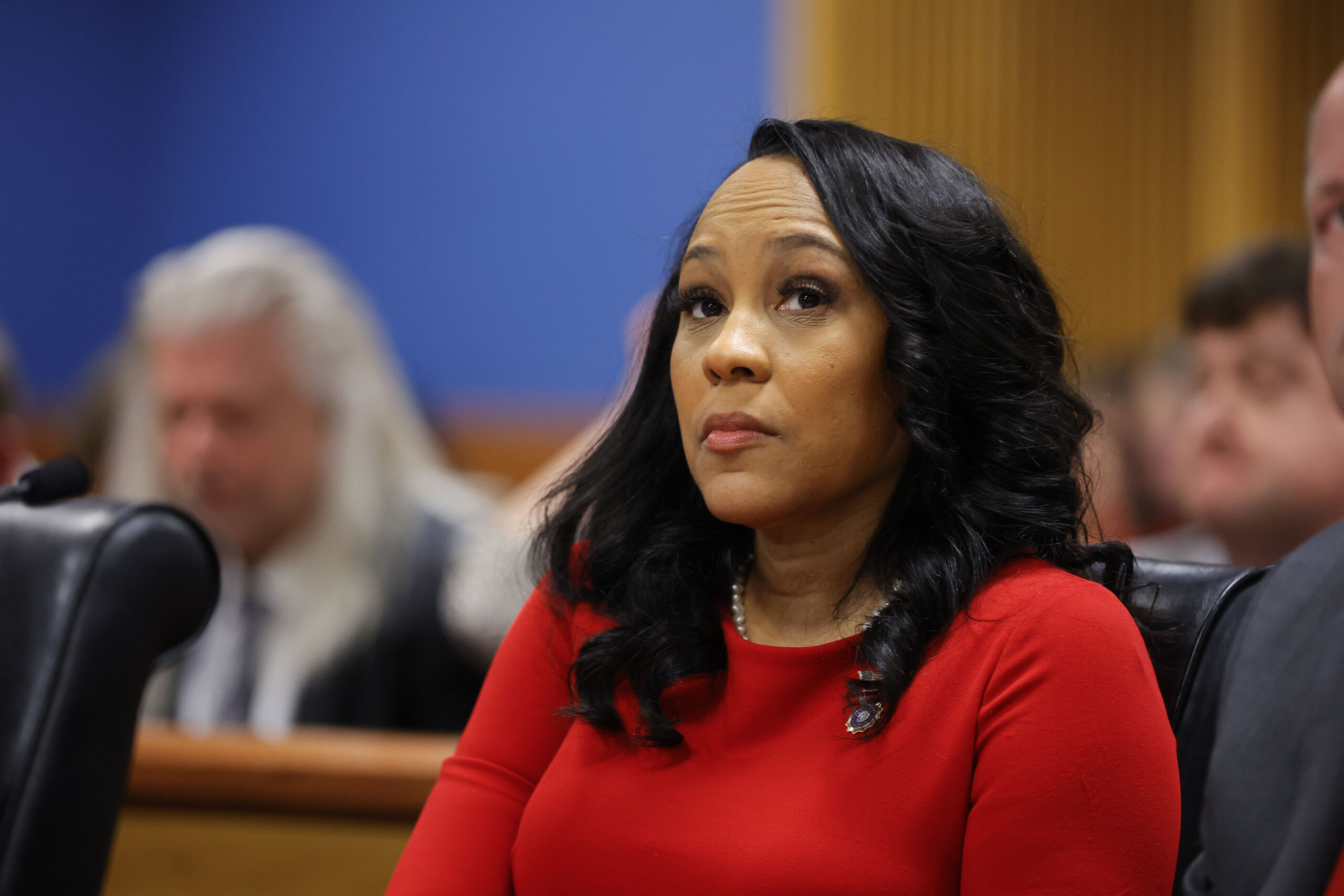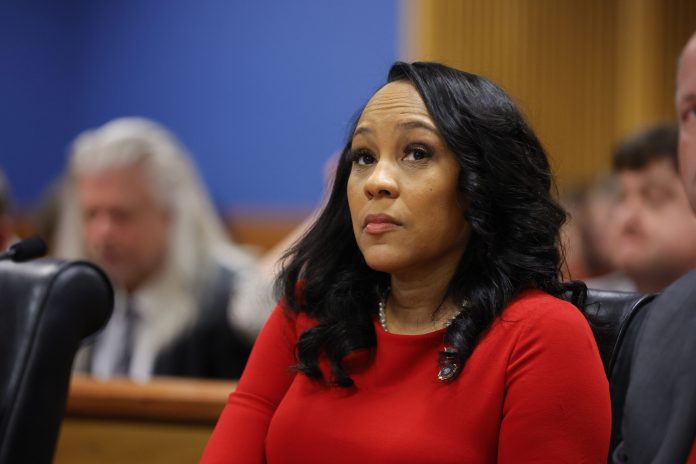
Fulton County District Attorney Fani Willis arrives during a hearing on the Georgia election interference case on Friday, March 1, 2024, in Atlanta. (AP Photo/Alex Slitz, Pool)
Fulton County District Attorney Fani Willis and special prosecutor Nathan Wade tampered with a witness and suborned perjury, a Friday court filing in the ongoing disqualification controversy alleges.
As the effort to remove the prosecutors from the racketeering (RICO) and election interference case brought against Donald Trump enters its waning days, the new claims come in a 20-page response that largely argues for the application of certain legal standards.
“Dissatisfied with merely perjuring themselves, the District Attorney and [Special Assistant District Attorney (SADA)] Wade engaged in a coordinated campaign to tamper with a witness and encourage the witness to present false testimony,” the filing reads.
The brief was filed in Fulton County Superior Court by Atlanta-based defense attorney Christopher Anulewicz on behalf of co-defendant Robert Cheeley, an Alpharetta-based attorney who is accused of providing state legislators with false evidence of electoral fraud in the aftermath of Trump’s loss to Joe Biden in the 2020 election.
Cheeley’s witness tampering and perjury allegations draw on two things: (1) testimony from the four-day hearing over claims of nepotism and self-dealing before Fulton County Superior Court Judge Scott McAfee and (2) a post-hearing request to re-open the evidence filed by co-defendant David Shafer, the onetime Georgia GOP chair who prosecutors claim was integral to the fake electors plot.
Another witness describes a phone call
As Law&Crime previously reported, Shafer’s request proposes the testimony of Cindi Lee Yeager, a prosecutor in nearby Cobb County.
Yeager’s testimony was offered to substantiate claims made by Terrence Bradley, Wade’s former divorce lawyer and law partner, regarding the timeline of the DA’s relationship with the man she put in charge of the most consequential criminal case in Peach State history.
Bradley said the two prosecutors “absolutely” began dating before Willis hired Wade — but that was out of court. When testifying under oath, however, Bradley said he could “not recall” or was only “speculating” about various details about the Willis-Wade relationship — including when the since-admitted tryst began.
The defense also offered Yeager’s testimony to refute key aspects of Bradley’s testimony — both about the nature of claims regarding the relationship and Bradley’s interactions with Willis herself.
From the Shafer motion, at length (emphasis in original):
In or around September of 2023, Mr. Bradley was visiting Ms. Yeager in her office when Mr. Bradley received a telephone call. Ms. Yeager could hear that the caller was District Attorney Willis. District Attorney Willis was calling Mr. Bradley in response to an article that was published about how much money Mr. Wade and his law partners had been paid in this case. Ms. Yeager heard District Attorney Willis tell Mr. Bradley: “They are coming after us. You don’t need to talk to them about anything about us.”
Defense attorneys have tried to make hay out of claims that Wade has been overpaid for his work and is otherwise not sufficiently qualified for the job his then-girlfriend allegedly hired him to do. Those arguments have not found much traction in McAfee’s courtroom.
The bigger issue with Yeager’s alleged claim about the phone call, rather, is if Bradley misrepresented his relationship with the district attorney — and the district attorney’s office did not correct the record for the court. If the judge finds Yeager a credible witness, that could mean trouble for the state’s case. Still, Shafer’s motion stopped well short of outright accusing Willis and Wade of witness tampering.
Notably, the alleged phone call between Bradley and Willis purportedly occurred over three months before defense attorney Ashleigh Merchant, who represents co-defendant Michael Roman, filed the disqualification motion in early January of this year.
Another phone call
Cheeley’s response also cites another phone call referenced during Bradley’s two times on the stand — in mid-February and late February.
“Bradley also testified that another attorney, Gabe Banks (a friend and former Fulton County ADA with Fani Willis, and whose wife currently works at the District Attorney’s Office), called him in advance of his testimony,” the Cheeley filing reads. “Mr. Bradley then took the stand and disclaimed any personal knowledge of the relationship between the District Attorney and SADA Wade, even though he had previously conveyed such knowledge to counsel for Roman and to Cobb ADA Ms. Yeager.”
During his testimony, Bradley discussed the phone call he received from former prosecutor and current defense attorney Gabe Banks.
That phone call, Merchant established, came “out of the blue” and had something to do with Bradley potentially testifying in the disqualification case. The defense had been trying to establish Banks made the call on Wade’s behalf and told Bradley not to testify — after Wade called Banks — with limited success.
After a series of typically forgetful, hesitating, and hedging answers, Merchant also got Bradley to testify that Banks brought up Bradley’s obligations to abide by the attorney-client privilege — the implication being that Bradley should not talk about Wade’s affair with Willis. Still, Bradley testified, he did not see the call from Banks as a threat.
Have a tip we should know? [email protected]

